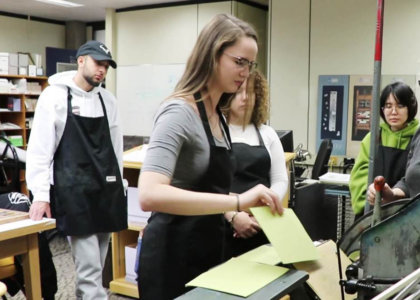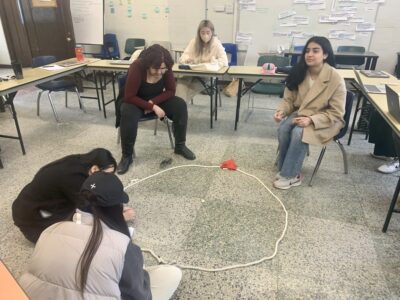For 20 years now, the Book & Media Studies program (BMS) at the University of St. Michael’s College has been challenging students to analyze the ways in which we express ourselves through different and often evolving forms of communication and to ask how this in turn can influence ways of thinking and being in society.

A key component of BMS over the past two decades has been to delve into the historical, global, and contemporary relationship between meaning and the forms through which a message is communicated or received. In that emphasis, of course, the program continues to develop and explore the famous theories of philosopher, literature scholar, and former St. Michael’s professor Marshall McLuhan.
From ancient codices and oral traditions through to electronic and digital media, Book & Media Studies offers an interdisciplinary and historical investigation into the role of printing, books, reading, and electronic and digital media in human communication and understanding. Course offerings include the study of manuscript and book production; book illustration and the relationship between word and image; advertising in different forms; censorship; the history of reading; and the development of mass media—the advent of radio and the emergence of television, global telecommunications, social media, and the Internet.
Course selections include cross-listed classes from St Mike’s College programs in Mediaeval Studies and Christianity & Culture as well as from other departments within the University of Toronto.
Professor Mark McGowan, one of the founders of the program, was new to the Principal’s Office in 2002 and spear-headed discussions with many University of Toronto colleagues about creating a program that would foster a critical examination of book history and print culture and an intensive approach to media literacy. The result was Book & Media Studies, one of the four sponsored programs hosted at St. Michael’s in conjunction with the University of Toronto.
The program’s first round of registration in 2003 saw 19 students register in BMS one of the largest sponsored undergraduate programs in the Humanities at the University of Toronto, with more than 700 students registered in the major, and 117 in the minor.
This year, the program is excited to take advantage of the College’s refurbishment and expansion of the Kelly Library Printing Room.

With the help of Massey College Printer Kit MacNeil, Interim Chief Librarian James Roussain has transformed the room into a unique teaching space that will provide students with hands-on experience in a series of new academic and experiential courses.
Next semester, the program is also honoured to be hosting MacNeil as a guest lecturer in The History of the Book course. As MacNeil notes, the subject of book history is global and ever-evolving as the very understanding of what constitutes a book constantly changes.
Today’s reading materials can take the shape of anything from a zine or chapbook toa digital message: “My iPad does not have pages but it can hold a dictionary and all of Proust whereas I can only fit so many volumes of Proust into my backpack,” notes MacNeil.
Students in MacNeil’s class will be encouraged to ponder the relationship between this changing of form and the ways in which content is understood, created, and received. They will also study the complex history and relationship between the physical and aesthetic qualities of the printed book. Students will study fonts, including non-Roman typefaces, as well as various styles of papermaking, and how ink is made. The printed page has been and continues to be extremely influential in society: MacNeil will also be offering workshops that teach students how to make their own zines and how to contextualize that practice in the study of the relationship between printing and social history.

Over the years, BMS has had a dedicated group of professors teaching core courses and topics in their areas of expertise. Professor Iris Gildea teaches courses that delve into the critical relationship between history, media forms, and the way that people think about such topics as the environment, social transgressiveness, and trauma; Professor Paolo Granata’s expertise ranges from book history through to media theory and the contemporary impact of AI; Professor Felan Parker studies contemporary media industries and the complexities inherent in the study of video games.
Some more recent additions to the faculty are adding even more perspectives on the topic: Professor Xianwei Wu specializes in Asian culture and communication; Dr. Stacy Reardon exposes students to in-depth study of library resources both physical and electronic; next semester, Professor Giulia Gaimari will be teaching a course on the Illustrated Dante from manuscript traditions to the contemporary day. In the next academic year, St Michael’s Principal and Professor Irene Morra will be offering courses that focus on constructions of national identity in various media from the plays of Shakespeare to the Beatles, to the BBC.
Author and longtime Globe & Mail journalist Michael Valpy, who has taught numerous courses over the years, appreciates the way the program has always responded to emerging issues and to changes in technology. His Media Ethics class, for example, now includes exploring ethical issues relating to Tik Tok, the social media video platform. One of the great pleasures for Valpy has also been interacting with the multicultural and international experience of the students who are in the program. These discussions only underline the extent to which a global educational perspective can help to teach Canadians about ourselves, he adds.
The program has also hosted many big names as visiting instructors: these courses have responded to and examined how head-line-making events are communicated and interpreted in the moment. During U.S. President Donald Trump’s term in office, for example, American historian and journalist Sam Tanenhaus taught Trump and the Media, which caught the attention of U.S. media outlets, including Vanity Fair magazine.

Quebecoise journalist Emilie Nicolas taught a course examining the impact of the #BlackLivesMatter movement. Jessica Johnson, former editor-in-chief of The Walrus magazine, co-designed and co-taught the course #MeToo in the Media with the late Anne Kingston. The winter semester will see Johnson return to teach a pertinent and timely course entitled The Future of Journalism.
“If ever there was a time to teach media literacy, this is it,” notes McGowan, adding that his assertion has been true as long as the program has been around. The World Wide Web was still in its infancy when the program was established, he notes, creating a whole new world to navigate, while today’s students continue to deal with “a wild west of new media,” including the emergence of bots, AI, and misinformation campaigns.
As it continues to respond to world issues and the emergence of new media forms, Book & Media Studies adheres to a firm conviction that the present can only be engaged with and understood through an engagement with the past. This consistent focus on past and present, on the importance of understanding and analysing various forms of communication and their complex and fascinating global history, on experience and practical engagement, speaks yet again to the quality and richness of the academic community at St. Michael’s College.
This article was originally published in the 2023 Fall/Winter issue of St. Michael’s Alumni magazine.
